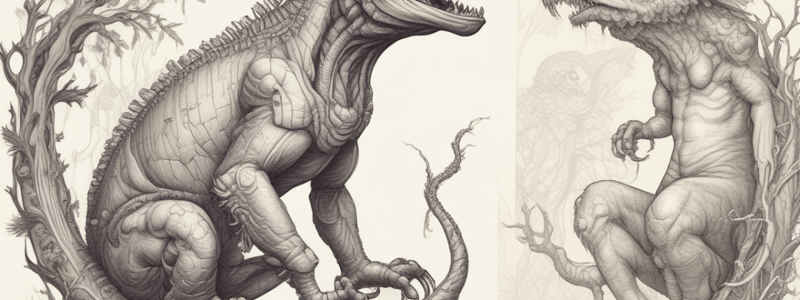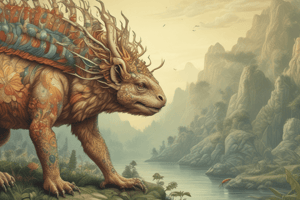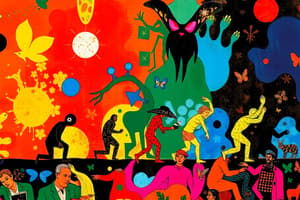Podcast
Questions and Answers
What is the primary mechanism responsible for the adaptation of organisms to their environment?
What is the primary mechanism responsible for the adaptation of organisms to their environment?
- Gene flow
- Mutation
- Natural selection (correct)
- Genetic drift
What is the result of a population experiencing a bottleneck, in terms of genetic variation?
What is the result of a population experiencing a bottleneck, in terms of genetic variation?
- Increased allelic variation
- No change in allelic variation
- Random change in allele frequencies
- Loss of allelic variation (correct)
What is the term for the random change in allele frequencies in a population over time?
What is the term for the random change in allele frequencies in a population over time?
- Gene flow
- Microevolution
- Natural selection
- Genetic drift (correct)
What is the term for the transfer of alleles from one population to another?
What is the term for the transfer of alleles from one population to another?
What is the primary source of genetic variation in a population, according to the text?
What is the primary source of genetic variation in a population, according to the text?
What was the key concept missing from Darwin's explanation of evolution, according to the text?
What was the key concept missing from Darwin's explanation of evolution, according to the text?
What is the primary effect of a bottleneck on a population's genetic variation?
What is the primary effect of a bottleneck on a population's genetic variation?
What is the primary mechanism responsible for the change in the average beak size of the finch population following the drought?
What is the primary mechanism responsible for the change in the average beak size of the finch population following the drought?
What is the main consequence of a reduction in population size on the population's genetic variation?
What is the main consequence of a reduction in population size on the population's genetic variation?
What is the role of genetic drift in conservation biology?
What is the role of genetic drift in conservation biology?
What is the effect of the influx of new alleles from other populations on the population's genetic variation?
What is the effect of the influx of new alleles from other populations on the population's genetic variation?
What is the primary difference between genetic drift and natural selection?
What is the primary difference between genetic drift and natural selection?
What is the primary reason why mutations have a small effect on allele frequencies from one generation to the next?
What is the primary reason why mutations have a small effect on allele frequencies from one generation to the next?
What is the term for the change in allele frequencies that occurs when a new population is established from a small group of individuals?
What is the term for the change in allele frequencies that occurs when a new population is established from a small group of individuals?
In a population that is not undergoing genetic drift, what is the primary mechanism by which allele frequencies can change over time?
In a population that is not undergoing genetic drift, what is the primary mechanism by which allele frequencies can change over time?
What is the term for the movement of individuals with different alleles into a population, which can increase genetic variation?
What is the term for the movement of individuals with different alleles into a population, which can increase genetic variation?
In the context of conservation biology, why is genetic drift a concern?
In the context of conservation biology, why is genetic drift a concern?
What is the term for the random change in allele frequencies that occurs when a population undergoes a bottleneck event?
What is the term for the random change in allele frequencies that occurs when a population undergoes a bottleneck event?
Flashcards are hidden until you start studying
Study Notes
Microevolution
- Microevolution is the change in allele frequencies in a population over time
- Three mechanisms cause allele frequency changes: natural selection, genetic drift, and gene flow
Natural Selection
- Only mechanism of adaptive evolution, improving the match between organisms and their environment
- Acts on individuals, affecting their survival and reproductive success relative to others in the population
- Individuals with variations better suited to the environment tend to produce more offspring
- Examples: finches with larger beaks surviving drought on Galápagos Islands, Drosophila melanogaster developing insecticide resistance
Evolution and Inheritance
- Mutation and sexual reproduction produce genetic variation, making evolution possible
- Charles Darwin proposed a mechanism for species change over time, but lacked understanding of inheritance
- Gregor Mendel's particulate hypothesis of inheritance stated that parents pass on discrete heritable units (genes) that retain their identities in offspring
Evolution at the Population Level
- Populations, not individuals, evolve
- Evolutionary impact of natural selection is apparent only in changes in a population over time
- Individual traits do not change during their lifetime, but populations can evolve through natural selection
Mechanisms of Evolution
- Mutation can ultimately have a large effect on allele frequencies when producing new alleles that strongly influence fitness
- Nonrandom mating affects frequencies of homozygous and heterozygous genotypes, but usually has no effect on allele frequencies
- Three mechanisms directly alter allele frequencies: natural selection, genetic drift, and gene flow
Studying That Suits You
Use AI to generate personalized quizzes and flashcards to suit your learning preferences.



